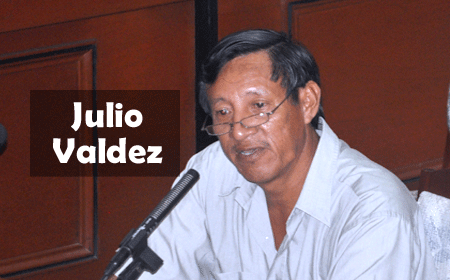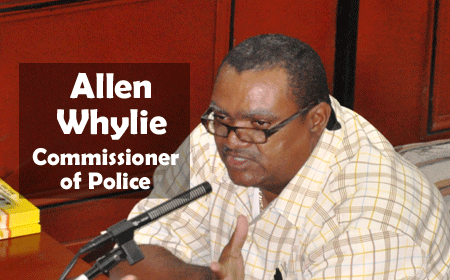The ex-Superintendent of Police refused to say who ordered him to stop investigating the immigration irregularities, “due to legal ramifications”
BELMOPAN, Wed. July 19, 2017–At the Senate Select Committee investigating the Auditor General’s report on the Immigration Department for the period 2011 to 2013, one of the highlights of the testimony of retired Superintendent of Police Julio Valdez, who appeared before the committee this morning, was his refusal to say who instructed him to stop investigating the irregularities found in some Immigration Department documents that the attorney, Arthur Saldivar, handed over to the police in October 2013.
In the wake of the Won Hong Kim fiasco (which came to light in September 2013), and the 2012 general elections, prior to which there had been large scale issuance of approvals for the granting of nationality to thousands of immigrants in Belize, corruption at the Immigration Department became a hot, national topic. Somehow Saldivar had gotten his hands on a trove of Immigration Department documents.
At the time, Saldivar told the media that the documents were slated for destruction and he salvaged them. Before police executed a search warrant at his home, Saldivar handed the documents over to police.
The Police Department decided to launch an investigation into how the documents were removed from the Immigration Department. The then head of the National Crime Investigation, Assistant Commissioner of Police, Russell Blackett, handed the responsibility for the investigation to Superintendent Julio Valdez.
During the course of his investigation, Valdez observed that there were some irregularities with some of the information contained in the immigration documents so besides investigating how the documents got out of the Immigration Department and into Saldivar’s hands, he began to focus on that as well.
Valdez, however, did not get very far with investigating the irregularities he found in the documents, the majority of which were traceable to Immigration clerk Ady Pacheco, who appeared to have initially handled the documents. Valdez said that he was ordered to stay on the course of his original investigation.
In explaining the irregularities, which he had mentioned that he wanted to further investigate, Valdez told the Senate, “Mr. Saldivar visited CIB office, Belize City. He handed some documents to Mr. Romero, who was NCIB in Belize City. Mr. Saldivar refused to give a statement to Mr. Romero, saying that if we are to start investigation into Mr. Penner, he would surely give a statement [then]. I perused some of them [the documents]. I noticed there were copies of nationality—signed, dated certificates. There were copies of passports. My other officers continued to investigate, trying to see how and why it came out of the Immigration Department, and how it reached Mr. Saldivar. Ms. Ady Pacheco, she was the person who apparently received all those files.


“She apparently was the counter clerk somewhere, but there is a receipt issued saying that application received, along with the other documents, copy of passports, police record, lab results and those receipts, that it was Ady Pacheco who received those files that were in our possession. What I do know subsequently was that those documents were taken out of the Immigration office, taken to Mr. Saldivar’s house. To date, I do not know or did not discover how those documents left the Immigration office. My experience as a police officer, I saw that some of these did not coincide with persons who come into the country and are granted nationality, so I commenced an investigation into the Nationality section, the application itself.”
Senator Courtenay asked Valdez to clarify a quote that was put in the public domain about irregularities (reportedly for nationality certificates for applicants who were unqualified) that he, Valdez, had found – referring to the quote as “a quote that apparently is taken from your report, which was sent to the DPP.”
The quoted statement was as follows: “After follow-up was done on this, and questions asked about these discrepancies, this line of investigation did not continue due to instructions. No other follow-up was made; it remained as is.”
“What do you mean by the fact that the investigation did not continue based on instructions?” Courtenay asked.
“I was already following the Immigration and Nationality Section and based on what I already encountered, I was waiting for the audit, and I had already visited all other addresses. I did not follow that up because the main concern was that I should follow up the missing documents out of the Immigration Department,” Valdez said.
“I am sure you will agree that it is important to understand and to know who, so that we can understand why, not to continue into these serious discrepancies,” Senator Courtenay told him.
Valdez explained that the first line of the investigation, his mission, was “the missing documents.”
“But you went on to the second [irregularities with some of the information contained in the immigration documents] and you received instructions not to continue, and I want to know who gave you those instructions,” Senator Courtenay said.
“The instructions were, deal with the investigation over the missing documents. Based on that, I did not continue the other line of investigation,” Valdez responded.
“I understand, and I am asking you now, who gave you those instructions?” Senator Courtenay said.
“I choose not to answer at this time, due to legal ramifications,” Valdez said.
“Was it a police officer above your rank?” Courtenay asked.
Valdez’s response to that question was, again, “I will choose not to answer that; I did not follow that investigation and I continued with the missing documents.”
“Did you receive instructions from anybody outside the police ranks with respect to this investigation?” Senator Courtenay asked.
“There were no instructions,” Valdez said.
Referring to the quote in the DPP’s report, Senator Courtenay again asked Valdez what he meant when he said that he discontinued his investigations into the irregularities contained in the documents, “due to instructions.”
Valdez replied that he was told to concern himself only with the missing documents that ended up in Saldivar’s hands.
Senator Courtenay again asked Valdez to name “the person or persons” who instructed him to stand down on the investigation into the irregularities found with some of the information contained in the immigration documents.
Valdez responded that he chose “not to answer that at this time.”
“Why?” Senator Courtenay asked him.
“Because due to legal ramifications,” Valdez said again.
Senator Courtenay asked him to expand, to explain what he meant when he spoke of “legal ramifications.”
To this, Valdez responded, “Mr. Courtenay, Senator, I have now retired out of the Belize Police Department. I am a civilian now. I do not want to be dragged back into court and all that thing, the legal ramifications, and the end result to prove that what I said is right. Based on that, I choose not to answer at this time.”
Valdez also told the Senate Select Committee that some of the immigration documents that the police got from Saldivar had wrong addresses and some of the addresses that were provided did not exist, and some were mere empty lots.
In the case of a street listed on an application as Sabal Street, Valdez said there is no such street in Dangriga.
There were applications on which there was only a reference to a general area such as Las Flores.
“It’s a big place, but I tried to find Chinese… Chinese aren’t hard to find; by experience they’re not hard to find. Either they open a snack shop, a restaurant or shop. It’s scarce to see Chinese living in a day-to-day house like everybody else in Belize; they must put up a business; they’re not hard to find. I made checks on these addresses and those addresses were there, but the people [under whose names they were listed] were non-existent at the address,” Valdez told the Senate.
Valdez said that his investigation took him back to the Philip Goldson International Airport, where he spoke to the Ports Commissioner about the list of people who had entered the country and whose nationality applications he was investigating.
In the afternoon session of the Senate hearings, Commissioner of Police Allen Whylie took the stand. In response to the burning, unanswered question of who told retired Superintendent Julio Valdez to drop his investigation into the irregularities found in some of the immigration documents that Saldivar gave to police, Whylie categorically denied that he was the one who directed Valdez to drop the investigation into that matter, and to concentrate on his original order to investigate how the documents that Saldivar had, had gotten out of the Immigration Department.
Commissioner Whylie responded, saying: “I don’t think so; it’s perhaps a misinterpretation on his part, because I’m saying that it was out there in the media that he had been stopped, and I knew that in the one meeting I had with him, I hadn’t stopped him. I had encouraged him to investigate, and that can be verified by another senior officer that was with me when he visited me.”
“But when you heard this, ComPol, did you not see it necessary to find out who had directed him in another way?” Senator Lizarraga asked.
“And that’s what I am saying,” Commissioner Whylie said. The Police Commissioner went on to state, “When I heard it in the media, and there was something from the DPP; I spoke to the Head, NCIB, and said, who had given Mr. Valdez such instructions.
“And he said he hadn’t, and I knew I didn’t; and so I had him bring Mr. Valdez to a meeting with me. And at that meeting, we thrashed it out in terms of what, and it was clear to me that Mr. Valdez felt that he had been instructed to discontinue. But I don’t see how he could have reached that conclusion any at all, because definitely, in my discussion with him around the 15 of January, 2014, it was the reverse. And that’s what I told him in the presence of a senior officer.
“But I gathered from our meeting that he felt he should not pursue that line of questioning, and I told him no, no, no, no; you need to clarify this issue, because if you don’t clarify this issue, I will take action. Because as I have always said, when it comes to the police institution, it is bigger than all of us.”
Senator Lizarraga asked Commissioner Whylie if Valdez had clarified the issue.
“Yes, he did clarify the issue; because I think he had written to the DPP saying he had been directed not to investigate, and he did clarify that matter with the DPP,” said Whylie.
Whylie, however, in the Senate hearing, threatened to sue Valdez if he had said that he, Whylie, had ordered him to stop the investigation into the serious irregularities in the immigration documents that Saldivar had released to police.
